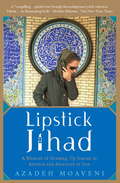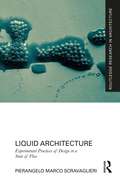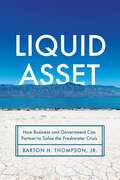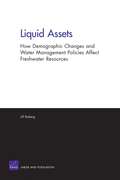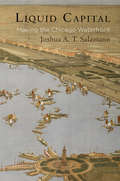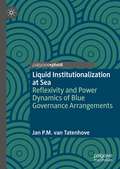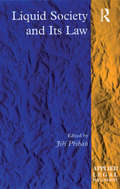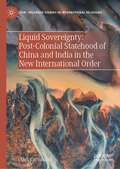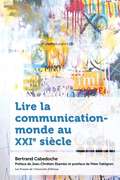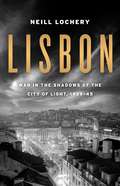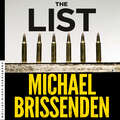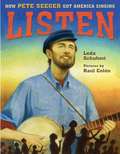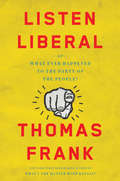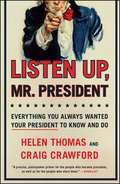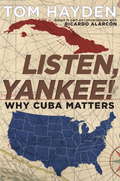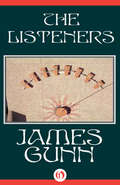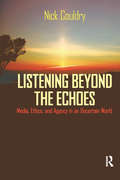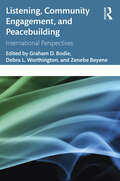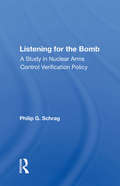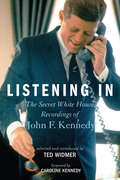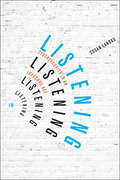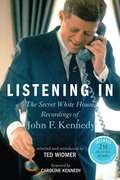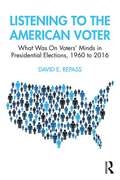- Table View
- List View
Lions under the Throne
by Stephen SedleyFrancis Bacon wrote in 1625 that judges must be lions, but lions under the throne. From that day to this, the tension within the state between parliamentary, judicial and executive power has remained unresolved. Lions under the Throne is the first systematic account of the origins and development of the great body of public law by which the state, both institutionally and in relation to the individual, is governed.
Lipstick Jihad: A Memoir of Growing up Iranian in America and American in Iran
by Azadeh MoaveniAs far back as she can remember, Azadeh Moaveni has felt at odds with her tangled identity as an Iranian-American. In suburban America, Azadeh lived in two worlds. At home, she was the daughter of the Iranian exile community, serving tea, clinging to tradition, and dreaming of Tehran. Outside, she was a California girl who practiced yoga and listened to Madonna. For years, she ignored the tense standoff between her two cultures. But college magnified the clash between Iran and America, and after graduating, she moved to Iran as a journalist. This is the story of her search for identity, between two cultures cleaved apart by a violent history. It is also the story of Iran, a restive land lost in the twilight of its revolution. Moaveni's homecoming falls in the heady days of the country's reform movement, when young people demonstrated in the streets and shouted for the Islamic regime to end. In these tumultuous times, she struggles to build a life in a dark country, wholly unlike the luminous, saffron and turquoise-tinted Iran of her imagination. As she leads us through the drug-soaked, underground parties of Tehran, into the hedonistic lives of young people desperate for change, Moaveni paints a rare portrait of Iran's rebellious next generation. The landscape of her Tehran -- ski slopes, fashion shows, malls and cafes -- is populated by a cast of young people whose exuberance and despair brings the modern reality of Iran to vivid life.
Liquid Architecture: Experimental Practices of Design in a State of Flux (Routledge Research in Architecture)
by Pierangelo Marco ScravaglieriLiquid Architecture challenges the idea of architecture as a fixed, inert container and reconceptualises it as a body whose boundaries are rather blurred and ever-changing. This book moves away from form as the primary driver of spatial protocols and explores what the built environment might look like when viewed through the lenses of a ‘wet ontology’ that is attentive to fluidity, flows and territorial dynamism. A reconfiguration of architectural materials and authorship is thus considered, leading, in turn, to an exploration of the ethical dimensions of co-designing with natural systems (of various viscosities) through liquid paradigms. The book examines a set of principles for practice-led discoveries that incorporate hybrid, mixed media with the author’s intersubjective relationship with liquid matter. Drawing from qualitative-based analytical investigation models, the text allows comprehension of the liquid phenomena via material contextualisation of an ever-becoming research setting. Through a practical and theoretical engagement with the ontology of liquids, the reader is exposed to a range of design-led experiments and creative propositions, visualisation systems, construction, and testing of physical models that collectively translate into a series of novel insights for architectural agendas. This book will be of interest to architecture and design research students and academics because it advocates the need for a more symbiotic and resilient approach to natural systems, which could benefit from the integration of regenerating material flows into our buildings and urban settlements.
Liquid Asset: How Business and Government Can Partner to Solve the Freshwater Crisis
by Barton H. Thompson Jr.A sweeping, policy-oriented account of the private and public management of the world's essential natural resource. Governments dominated water management throughout the twentieth century. Tasked with ensuring a public supply of clean, safe, reliable, and affordable water, governmental agencies controlled water administration in most of the world. They built the dams, reservoirs, and aqueducts that store water when available and move that water to areas with increasing populations and economies. Private businesses sometimes played a part in managing water, but typically in a supporting position as consultants or contractors. Today, given the global need for innovative new technologies, institutions, and financing to solve the freshwater crisis, private businesses and markets are playing a rapidly expanding role, bringing both new approaches and new challenges to a historically public field. In Liquid Asset, Barton H. Thompson, Jr. examines the growing position of the private sector in the "business of water." Thompson seeks to understand the private sector's involvement in meeting the water needs of both humans and the environment, looks at the potential risks that growing private involvement poses to the public interest in water, and considers the obstacles that private organizations face in trying to participate in a traditionally governmental sector. Thompson provides a richly detailed analysis to foster both improved public policy and responsible business behavior. As the book demonstrates, the story of private businesses and water offers a window into the serious challenges facing freshwater today, and their potential solutions.
Liquid Assets
by Jill BobergMost writings linking demographic trends to water availability often look only at population-growth effects, treating water supplies as static and population as increasing, inexorably leading to a water-availability crisis. This report's more holistic view of the interaction between demographics and water resources considers more demographic and local water-availability variables. It focuses on conditions in developing countries, where these factors intersect with the fewest socioeconomic resources to mediate.
Liquid Capital: Making the Chicago Waterfront (American Business, Politics, and Society)
by Joshua A. SalzmannIn the nineteenth century, politicians transformed a disease-infested bog on the southwestern shore of Lake Michigan into an intensively managed waterscape supporting the life and economy of Chicago, now America's third-most populous city. In Liquid Capital, Joshua A. T. Salzmann shows how, through a combination of entrepreneurship, civic spirit, and bareknuckle politics, the Chicago waterfront became a hub of economic and cultural activity while also the site of many of the nation's precendent-setting decisions about public land use and environmental protection. Through the political saga of waterfront development, Salzmann illuminates Chicago's seemingly paradoxical position as both a paragon of buccaneering capitalism and assertive state power.The list of actions undertaken by local politicians and boosters to facilitate the waterfront's success is long: officials reversed a river, built a canal to fuse the Great Lakes and Mississippi River watersheds, decorated the lakeshore with parks and monuments, and enacted regulations governing the use of air, land, and water. With these feats of engineering and statecraft, they created a waterscape conducive to commodity exchange, leisure tourism, and class harmony—in sum, an invaluable resource for profit making. Their actions made the city's growth and the development of its western hinterlands possible. Liquid Capital sheds light on these precedent-making policies, their effect on Chicago's development as a major economic and cultural force, and the ways in which they continue to shape legislation regarding the use of air and water.
Liquid Institutionalization at Sea: Reflexivity and Power Dynamics of Blue Governance Arrangements
by Jan P.M. van TatenhoveThis book presents an innovative theory of liquid institutionalization at sea and explores the building blocks of this theory focusing in particular on institutionalization, blue governance arrangements, reflexivity and power. The book opens with an overview of stability and change in new institutional theory before moving on to discuss liquid institutionalization in more detail. The author applies this approach to three different cases: Arctic shipping; deep seabed mining; and transboundary regionalization in Europe. For each of these cases the book describes the emerging blue governance arrangements, the type of liquid institutionalization and the consequences this has for power and reflexivity.
Liquid Society and Its Law (Applied Legal Philosophy)
by Jiří PřibáňThis collection of essays brings together Zygmunt Bauman and a number of internationally distinguished legal scholars who examine the influence of Bauman's recent works on social theory of law and socio-legal studies. Contributors focus on the concept of 'liquid society' and its adoption by legal scholars. The volume opens with Bauman's analysis of fears and policing in 'liquid society' and continues by examining the social and legal theoretical context and implications of Bauman's theory.
Liquid Sovereignty: Post-Colonial Statehood of China and India in the New International Order (Palgrave Studies in International Relations)
by Aleš KarmazinThis book project studies the variation of sovereignty in international order by analysing how the general model of sovereignty is localised in the political practice of two major non-Western rising powers, namely China and India. It aims to investigate how the sovereignty of these states is constituted, which includes the question of how sovereignty works and becomes constituted in specific contexts and cases that fall outside the discourses and positions of the so-called Westphalian (conservative, absolutist) sovereignty that is dominantly advocated by these two states on a global level. The core of this project explores specific contested cases and situates them vis-à-vis the broader approaches of China and India to sovereignty. I specifically analyse four particular cases: China’s approach to sovereignty in relation to Hong Kong and Taiwan and India’s approach to sovereignty in relation to Bhutan and Kashmir. In doing so, I will illustrate that sovereignty is a flexible and plastic phenomenon which can be intertwined with principles, models or practices that are usually seen as divergent from or contradicting sovereignty; for example, those that derive from China’s and India’s imperial and colonial history.
Lire la communication-monde au XXIe siècle (Hors collection)
by Professeur Bertrand CabedocheHallowed in course titles and leveraged in the nomenclature of international organizations, yet unfit to bring any clarification or synthesis that actually provides structure, the objectifying expression communication internationale has no scientific value, except as a research object. Yet, the expression bears meanings that must urgently be put into perspective, since it lends itself to discursive construct which often varies greatly according to the crossed—and often masked—interests of an ever-increasing number of actors on a global scale and based on the political-cultural fields where these tactical productions are disseminated. The first option for an enlightening approach is through the thread of an academically recognized discipline. More specifically, the introduction of information-communication science in France in 1978 opens up a corpus of theoretical approaches and epistemological questionings that are already meaningful, although they are limited to a single country. Taking notice of the multiple and sometimes competing scientific productions and collaborations that extend this time to whole continents, the crossed questioning reveals epistemological, theoretical, conceptual, and methodological inflections that support a provisional state of the research. Then, the concept of communication-monde, sketched by Armand Mattelart and elevated to the rank of structuring concept in the book, enables us to read the global stakes of communication as we step into the third millennium and acts as a decentring force against the permanent risks of ethnocentric thinking.
Lisbon: War in the Shadows of the City of Light, 1939-45
by Neill LocheryLisbon had a pivotal role in the history of World War II, though not a gun was fired there. The only European city in which both the Allies and the Axis power operated openly, it was temporary home to much of EuropeOCOs exiled royalty, over one million refugees seeking passage to the U. S. , and a host of spies, secret police, captains of industry, bankers, prominent Jews, writers and artists, escaped POWs, and black marketeers. An operations officer writing in 1944 described the daily scene at LisbonOCOs airport as being like the movie ?Casablanca, OCO times twenty. In this riveting narrative, renowned historian Neill Lochery draws on his relationships with high-level Portuguese contacts, access to records recently uncovered from Portuguese secret police and banking archives, and other unpublished documents to offer a revelatory portrait of the WarOCOs back stage. And he tells the story of how Portugal, a relatively poor European country trying frantically to remain neutral amidst extraordinary pressures, survived the war not only physically intact but significantly wealthier. The countryOCOs emergence as a prosperous European Union nation would be financed in part, it turns out, by a cache of Nazi gold.
The Lisbon Treaty
by Jean-Claude PirisGiven the controversies and difficulties which preceded the coming into force of the Lisbon Treaty, it is easy to forget that the Treaty is a complex legal document in need of detailed analysis for its impact to be fully understood. Jean-Claude Piris, the Director General of the Legal Service of the Council of the European Union, provides such an analysis, looking at the historical and political contexts of the Treaty, its impact on the democratic framework of the EU and its provisions in relation to substantive law. Impartial legal analysis of the EU's functions, its powers and the treaties which govern it make this the seminal text on the most significant recent development in EU law.
The List
by Michael BrissendenSidney Allen is a Fed. Part of the Australian Federal Police's K block, a unit doing whatever it takes in order to stop terrorist attacks on home soil. But when young Muslim men on the Terror Watchlist start turning up dead, Sid and his partner, Haifa, have to work out what's going on. Sectarian war? Drugs? Retribution? <p><p>For Sid, there's nothing unclear about a bullet to the head and a severed hand. Someone is sending a message. Deciphering that message reveals a much wider threat and Sid and the agency have to decide just how far they'll go to prevent a deadly attack. Time is running out ... for them and Australia. From the brutal battlegrounds of Afghanistan, to the western Sydney suburbs and the halls of power in Canberra, THE LIST is a page-turning thriller where justice, revenge and the war on terror collide.
Listen: How Pete Seeger Got America Singing
by Leda SchubertListen.There was nobody like Pete Seeger.Wherever he went, he got people singing. With his head thrown backand his Adam’s apple bouncing,picking his long-necked banjoor strumming his twelve-string guitar,Pete sang old songs,new songs,new words to old songs,and songs he made up.In this gorgeously written and illustrated tribute to legendary musician and activist Pete Seeger, author Leda Schubert highlights major musical events in Mr. Seeger's life as well important moments of his fight against social injustice. From singing sold-out concerts to courageously standing against the McCarthy-era finger-pointing, Pete Seeger's life is celebrated in this bold book for young readers with gorgeous illustrations by Raúl Colón.A Neal Porter BookThis title has Common Core connections.
Listen, Liberal: Or, What Ever Happened to the Party of the People?
by Thomas FrankFrom the bestselling author of What's the Matter With Kansas, a scathing look at the standard-bearers of liberal politics -- a book that asks: what's the matter with Democrats?It is a widespread belief among liberals that if only Democrats can continue to dominate national elections, if only those awful Republicans are beaten into submission, the country will be on the right course. But this is to fundamentally misunderstand the modern Democratic Party. Drawing on years of research and first-hand reporting, Frank points out that the Democrats have done little to advance traditional liberal goals: expanding opportunity, fighting for social justice, and ensuring that workers get a fair deal. Indeed, they have scarcely dented the free-market consensus at all. This is not for lack of opportunity: Democrats have occupied the White House for sixteen of the last twenty-four years, and yet the decline of the middle class has only accelerated. Wall Street gets its bailouts, wages keep falling, and the free-trade deals keep coming. With his trademark sardonic wit and lacerating logic, Frank's Listen, Liberal lays bare the essence of the Democratic Party's philosophy and how it has changed over the years. A form of corporate and cultural elitism has largely eclipsed the party's old working-class commitment, he finds. For certain favored groups, this has meant prosperity. But for the nation as a whole, it is a one-way ticket into the abyss of inequality. In this critical election year, Frank recalls the Democrats to their historic goals-the only way to reverse the ever-deepening rift between the rich and the poor in America.
Listen Up, Mr. President: Everything You Always Wanted Your President to Know and Do
by Helen Thomas Craig CrawfordHelen Thomas has covered the administrations of ten presidents in a career spanning nearly sixty years. She is known for her famous press conference closing line, "Thank you, Mr. President," but here she trades deference for directness. Thomas and veteran journalist Craig Crawford hold nothing back as they use former occupants of the White House to provide a witty, history-rich lesson plan of what it takes to be a good president. Combining sharp observation and dozens of examples from the fi rst presidency through the forty-fourth, the authors outline the qualities, attitudes, and political and personal choices that make for the most successful leaders, and the least. Calvin Coolidge, who hired the fi rst professional speechwriter in the White House, illuminates the importance of choosing words wisely. William Howard Taft, notorious for being so fat he broke his White House bathtub, shows how not to cultivate a strong public image. John F. Kennedy, who could handle the press corps and their questions with aplomb, shows how to establish a rapport with the press and open oneself up to the public. Ronald Reagan, who acknowledged the Iran-Contra affair in a television address, demonstrates how telling hard truths can earn forgiveness and even public trust. By gleaning lessons from past leaders, Thomas and Crawford not only highlight those that future presidents should follow but also pinpoint what Americans should look for and expect in their president. Part history lesson, part presidential primer,Listen Up, Mr. Presidentis smart, entertaining, and exceedingly edifying.
Listen, Yankee!
by Tom HaydenBased on unprecedented access to both Cuban and American officials, a book that offers fresh insight into one of history's most enigmatic relationships between nation-states--from one of America's best-known voices of political and social activism.Listen, Yankee! offers an account of Cuban politics from Tom Hayden's unique position as an observer of Cuba and as a US revolutionary student leader whose efforts to mobilize political change in the US mirrored the radical transformation simultaneously going on in Cuba.Chapters are devoted to the writings of Che Guevara, Régis Debray, and C. Wright Mills; the Cuban missile crisis; the Weather Underground; the assassination of JFK; the strong historical links between Cuba and Africa; the Carter era; the Clinton era; the Cuban Five; Elián González; and the December 17, 2014 declaration of normalization by presidents Obama and Castro.Hayden puts the present moment into historical context, and shows how we're finally finding common ground to the advantage of Cubans and Americans alike. From the Hardcover edition.
The Listeners
by James GunnAfter fifty-one long years of patient waiting, the message has finally arrived. They have dedicated their lives to trying to decipher the eerie silence that resounds from space and now there is finally a sound after decades of quiet. In the beginning there is a hail of celebration--the Project has finally produced results--but then the questions begin. What does the message mean? Could it be 'We come in peace' or 'Get ready for world domination'? The message baffles Earth. Only one man has the power to make the decision and it could mean intergalactic warfare if he makes the wrong choice. Director MacDonald holds in his hands the fate of Earth, the universe and the Project, which is dedicated to answering questions that have plagued humanity for centuries. Will he make the correct choice?
Listening Beyond the Echoes: Media, Ethics, and Agency in an Uncertain World
by Nick CouldryIn this book Nick Couldry, media and cultural theorist from the London School of Economics, asks what are the priorities for media and cultural research today - at a time of the intensified mediation of all fields of social life, threats to democratic legitimacy, and serious instability on the global political stage. The book calls for a "decentered" media research that rejects easy assumptions about media's role in holding societies together and instead looks more critically at the difference media make on the ground to the material conditions of our lives. In what detailed ways do media transform knowledge and agency in daily life? How do media contribute to the culture of democratic politics? And, most difficult of all, how can we live, ethically, with and through media? Couldry's previous work is well known for its breadth, ranging across media sociology, media theory and cultural theory. Here he draws also on political theory and ethics to develop a tightly-argued account of how media and cultural research must now reorient itself if it is to remain relevant and critical. Nick Couldry is Reader in Media, Communications and Culture at the London School of Economics and Political Science. He is the author or editor of five books including Media Rituals: A Critical Approach (Routledge 2003), The Place of Media Power (Routledge 2000) and (coedited with James Curran) Contesting Media Power (Rowman and Littlefield 2003).
Listening, Community Engagement, and Peacebuilding: International Perspectives
by Graham D. Bodie Debra L. Worthington Zenebe BeyeneThis book explores the role of listening in community engagement and peacebuilding efforts, bridging academic research in communication and practical applications for individual and social change. For all their differences, community engagement and peacebuilding efforts share much in common: the need to establish and agree on achievable and measurable goals, the importance of trust, and the need for conflict management, to name but a few. This book presents listening – considered as a multi-disciplinary concept related to but distinct from civility, civic participation, and other social processes – as a primary mechanism for accomplishing these tasks. Individual chapters explore these themes in an array of international contexts, examining topics such as conflict resolution, restorative justice, environmental justice, migrants and refugees, and trauma-informed peacebuilding. The book includes contemporary literature reviews and theoretical insights covering the role of listening as related to individual, social, and governmental efforts to better engage communities and build, maintain, or establish peace in an increasingly divided world. This collection provides invaluable insight to researchers, students, educators, and practitioners in intercultural and international communication, conflict management, peacebuilding, community engagement, and international studies.
Listening For The Bomb: A Study In Nuclear Arms Control Verification Policy
by Philip G. SchragGraham Allison's book Essence of Decision changed the way in which academic analysts think about how governments make major foreign and defense policy decisions.1 Before Allison's book appeared in 1971, even the leading writers on foreign policy tended to describe and explain governmental decisions almost exclusively as if governments were rational human beings making carefully considered choices among available options. This book applies the Allisonian framework to the response of the United States government to a private arms control initiative undertaken in 1986 by the Natural Resources Defense Council, an environmental organization.
Listening In: The Secret White House Recordings of John F. Kennedy
by Caroline Kennedy Ted WidmerIn July 1962, in an effort to preserve an accurate record of Presidential decision-making in a highly charged atmosphere of conflicting viewpoints, strategies and tactics, John F. Kennedy installed hidden recording systems in the Oval Office and in the Cabinet Room. The result is a priceless historical archive comprising some 265 hours of taped material. JFK was elected president when Civil Rights tensions were near the boiling point, and Americans feared a nuclear war. Confronted with complex dilemmas necessitating swift and unprecedented action, President Kennedy engaged in intense discussion and debate with his cabinet members and other advisors. Now, in conjunction with the fiftieth anniversary of the Kennedy presidency, the John F. Kennedy Library and historian Ted Widmer have carefully selected the most compelling and important of these remarkable recordings for release, fully restored and re-mastered onto two 75-minute CDs for the first time. Listening In represents a uniquely unscripted, insider account of a president and his cabinet grappling with the day-to-day business of the White House and guiding the nation through a hazardous era of uncertainty.Accompanied by extensively annotated transcripts of the recordings, and with a foreword by Caroline Kennedy, Listening In delivers the story behind the story in the unguarded words and voices of the decision-makers themselves. Listening In covers watershed events, including the Cuban Missile Crisis, the Space Race, Vietnam, and the arms race, and offers fascinating glimpses into the intellectual methodology of a circumspect president and his brilliant, eclectic brain trust. Just as the unique vision of President John F. Kennedy continues to resonate half a century after his stirring speeches and bold policy decisions, the documentary candor of Listening In imparts a vivid, breathtaking immediacy that will significantly expand our understanding of his time in office.
Listening In: Cybersecurity in an Insecure Age
by Susan LandauA cybersecurity expert and former Google privacy analyst’s urgent call to protect devices and networks against malicious hackers and misinformed policymakers New technologies have provided both incredible convenience and new threats. The same kinds of digital networks that allow you to hail a ride using your smartphone let power grid operators control a country’s electricity—and these personal, corporate, and government systems are all vulnerable. In Ukraine, unknown hackers shut off electricity to nearly 230,000 people for six hours. North Korean hackers destroyed networks at Sony Pictures in retaliation for a film that mocked Kim Jong-un. And Russian cyberattackers leaked Democratic National Committee emails in an attempt to sway a U.S. presidential election. And yet despite such documented risks, government agencies, whose investigations and surveillance are stymied by encryption, push for a weakening of protections. In this accessible and riveting read, Susan Landau makes a compelling case for the need to secure our data, explaining how we must maintain cybersecurity in an insecure age.
Listening In: The Secret White House Recordings of John F. Kennedy
by Ted WidmerIn July 1962, in an effort to preserve an accurate record of Presidential decision-making in a highly charged atmosphere of conflicting viewpoints, strategies and tactics, John F. Kennedy installed hidden recording systems in the Oval Office and in the Cabinet Room. The result is a priceless historical archive comprising some 265 hours of taped material. JFK was elected president when Civil Rights tensions were near the boiling point, and Americans feared a nuclear war. Confronted with complex dilemmas necessitating swift and unprecedented action, President Kennedy engaged in intense discussion and debate with his cabinet members and other advisors. Now, in conjunction with the fiftieth anniversary of the Kennedy presidency, the John F. Kennedy Library and historian Ted Widmer have carefully selected the most compelling and important of these remarkable recordings for release, fully restored and re-mastered onto two 75-minute CDs for the first time. Listening In represents a uniquely unscripted, insider account of a president and his cabinet grappling with the day-to-day business of the White House and guiding the nation through a hazardous era of uncertainty. Accompanied by extensively annotated transcripts of the recordings, and with a foreword by Caroline Kennedy, Listening In delivers the story behind the story in the unguarded words and voices of the decision-makers themselves. Listening In covers watershed events, including the Cuban Missile Crisis, the Space Race, Vietnam, and the arms race, and offers fascinating glimpses into the intellectual methodology of a circumspect president and his brilliant, eclectic brain trust. Just as the unique vision of President John F. Kennedy continues to resonate half a century after his stirring speeches and bold policy decisions, the documentary candor of Listening In imparts a vivid, breathtaking immediacy that will significantly expand our understanding of his time in office.
Listening to the American Voter: What Was On Voters' Minds in Presidential Elections, 1960 to 2016
by David E. RePassThis book explains why elections from 1960 to 2016 came out the way they did. Why did voters choose one candidate over the other and what issues were they concerned with? The answer comes from talking to thousands of voters and analyzing their verbatim responses. Traditional methods used by most political analysts have often led to false interpretations. The book presents a unique model that can predict the vote of 95 percent of respondents. The book also shows that there are two major forces—long-term and short-term—that can explain the overall results of an election. In addition, the author finds a new, highly reliable way to measure the ideological composition of the American electorate. Appropriate for students of American government and informed citizens as well, this book is a revolution in the study of electoral behavior.

